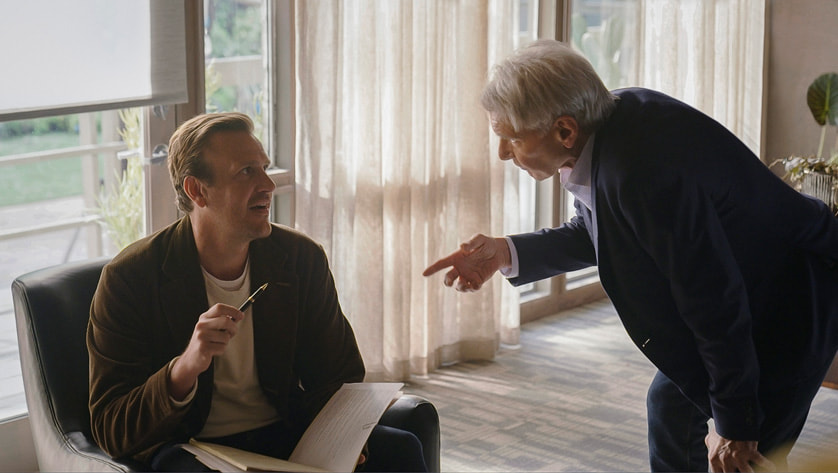A decade or so ago, a story like “Shrinking” would have likely made for an indie comedy and a forgettable one at that. It’s a quirky story about how good advice is much easier said than done, centered around a therapist (played here by Jason Segel) who starts to work outside the textbook. Cue the hand claps and guitar strums. Premiering this week on Apple TV+, “Shrinking” does indeed have Starbucks rock for its soundtrack and many other familiar comfy comedy elements. But “Shrinking” justifies its size, as it fills its world with distinct characters, all of them works in progress, even the professionals. Co-created by Brett Goldstein, Bill Lawrence (both of “Ted Lasso”), and Jason Segel, “Shrinking” has a good grasp of its thoughtful quirkiness, while also knowing how to let its characters run free.
The comedy of “Shrinking” is initially a bit dire, as it coasts on some easy Jason Segel-isms while establishing his recently widowed therapist. Segel plays piano, he does an impression of Dracula a la “Forgetting Sarah Marshall,” and generally has the towering puppy energy we’ve come to know him for. Worse enough, the series leans too hard on its initial pitch of “Bad Therapist,” showing him as a wounded party animal with little professional composure. So that the pilot can make him a concrete underdog, we become unable to understand if Jimmy is actually good at his hard-earned job. His gruff superior, Paul (Harrison Ford), is deeply unamused, and we get why.

Everyone on this show has a problem that’s become their weak spot. Even when Jimmy’s life is coming back together, he still has a strained relationship with his daughter Alice (Lukita Maxwell), who barely talks to him, and has become closer with next-door neighbor Liz (Christa Miller). Alice was left alone to care for herself more or less after her mother died, which also made her closer to Paul. And Paul has a Parkinson’s diagnosis hidden from his daughter, too stubborn to be open to the help he needs. There are many interconnected relationships to be mended in this show, and much of its momentum comes from how allegiances can change throughout.
Things start to change when Jimmy starts working with a Black veteran named Sean (Luke Tennie), who has a penchant for violence when provoked, and who carries unspoken anger from his time in the military overseas. Jimmy starts to take some wild professional lunges—during a session, he decides they need to do something different, and poof, they are at a boxing gym. Jimmy thinks that fighting in a contained situation will help, but when Sean is faced with an altercation later that week, it puts Sean in jail overnight and gets him kicked out of his parents’ house. “Shrinking” can cause minor whiplash in how it goes from sweet to bracing jokes about racial optics, which Jimmy is clueless about. But it works to get “Shrinking” to a premise that only sounds like a chintzy sitcom premise when Sean moves in with Jimmy. It’s not good boundaries for a therapist and their patient, but “Shrinking” eventually finds a way to make it especially funny.
Around episodes two or three, Segel’s grounded goofiness centers the show, and the series successfully stabilizes its type of mental health comedy as being slightly elevated. Jimmy is the kind of therapist who shows up at his client’s dinner to give him a pep talk about not making an insincere ass of himself or dashes away from a surprise confrontation with another—that is, not the kind that should be taken too literally. By no coincidence, the show becomes funnier with how everyone acts and embraces a dark joke: asides about Jimmy’s dead wife or Paul having Parkinson’s only make “Shrinking” a bit more like life.

It helps that Segel is surrounded by such a good supporting cast, who make familiar roles more or less their own and create numerous enjoyable ensemble scenes when they are all together. Harrison Ford is a bit rocky with some of the show’s more grating quirky moments—you can always tell when he cares about a particular line or not—but also makes for laugh-out-loud remarks of disgust toward Jimmy. Ford’s Paul is also framed wonderfully as a direct opposite to Jessica Williams’ Gabby, who also works at Paul and Jimmy’s office. She is a ray of sunshine who unabashedly covers her water bottles and laptop in stickers. The chemistry between Ford and Williams is so calibrated but effective that it makes a heartwarming moment out of them listening to ‘90s pop in her Tesla. Other pairings in other shows couldn’t make such a scene (product placement; easy crowd-pleasing moment) feel close to sincere.
Episode by episode, it’s notable how “Shrinking” isn’t rushing to get anywhere. But the characters are so strong, with the plotting always keeping their dysfunctional relationships in flux, that the series works as a hangout in which you care most about everyone’s honesty with themselves and others. “Shrinking” can be as sunny and easygoing as the Pasadena weather that surrounds them, but that provides all the more space for the heavier stuff to have its place. It’s all part of the show’s coziness, which comes with room for encouraging growth.
Six episodes screened for review. The first two episodes of “Shrinking” premiere on Apple TV+ on January 27th.












